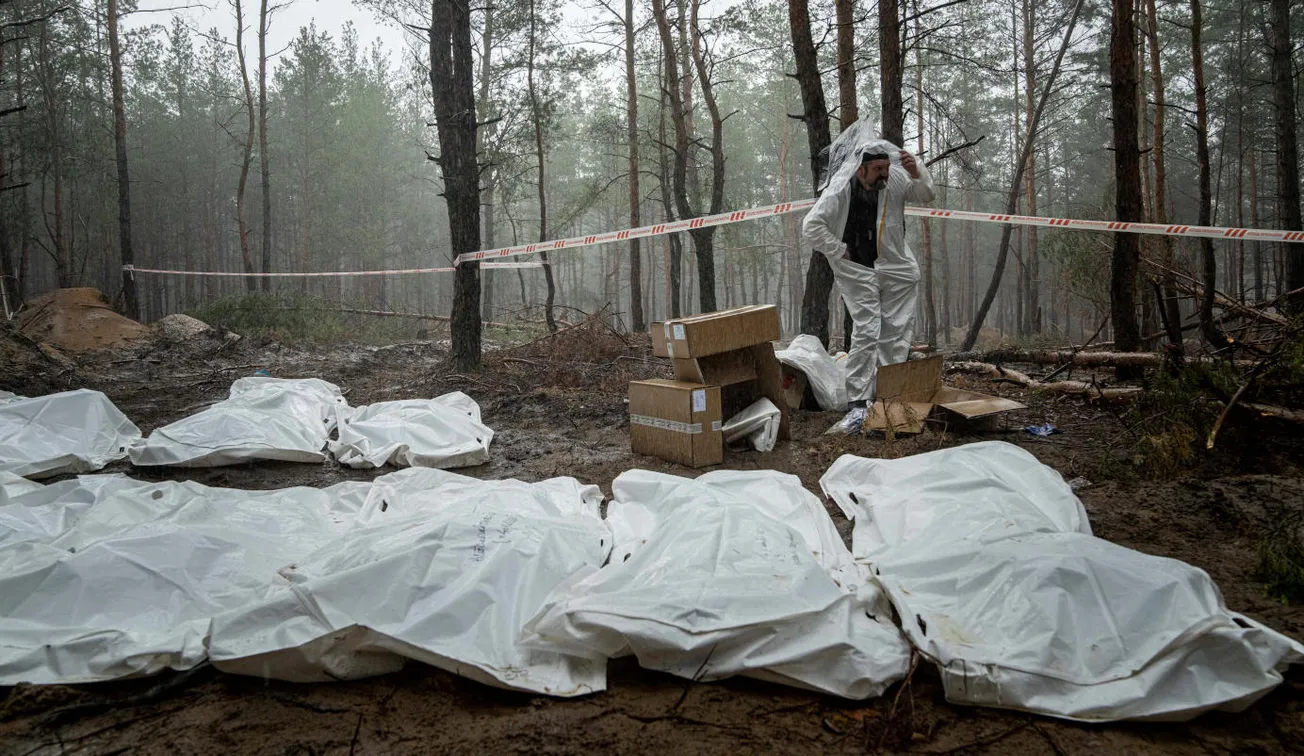Publisher’s note: The following story was written by Mark Sumner, who has been covering the Russian invasion of Ukraine from here in the United States since the war began. This story contains graphic images and details. I am publishing it because it is important that this story be told.
This is, in many ways, the easiest job of “war correspondent” anyone has ever had. No one is shooting at me. I’m not wearing a flack jacket, sleeping on a cot, or feeling the concussive thump as artillery strikes the ground nearby. The only threats I get arrive by email. The real correspondents, the one who deserve every word of praise and unlimited appreciation, are the ones who have already given their lives so that the world could be informed about the injustice of the unprovoked, illegal invasion of Ukraine, and about the desperate resistance of the Ukrainian people.
39 journalists killed in Ukraine since the beginning of Russia's full-scale invasion - minister of culture and information policy
— Euromaidan Press (@EuromaidanPress) September 16, 2022
Today is the Day of Remembrance of Ukrainian Journalists marked in Ukraine every year on the third Friday of September.https://t.co/8blGCehOBS pic.twitter.com/zIvYeaxyP6
This week didn’t just mark a day of remembrance for those journalists lost in reporting this war, it provided the grimmest of reminders about why Russia must be defeated. And it did so in a way that, even for armchair journalists over 5,000 miles away, was very difficult to take.
As Ukraine made its sweeping counteroffensive across Kharkiv Oblast over the last week, it liberated over 8,500 square kilometers and over 350 cities, towns, and villages from Russian occupation. And in just the last few days, as that darkness was stripped away, we’ve begun to get a glimpse of what was happening behind the front lines.
This isn’t the first time. When Russia’s attempt to capture Kyiv collapsed at the beginning of April, every step Ukrainian forces took into the area that Russia had occupied seemed to reveal a fresh set of atrocities. No place seemed more emblematic of the horrors Russia had committed than Bucha, where a mass grave containing over 450 bodies, bodies that illustrated cruelty including torture, rape, murder, and dismemberment. More than twenty bodies lay in the streets of Bucha for weeks without any of the Russian forces making a move to bury them. Some of those bodies had been run over multiple times by Russian vehicles. Including tanks.
Bucha wasn’t alone. As Russian forces moved back toward the border, the same story was found at both what had been bustling towns and in tiny villages. Torture chambers and mass graves. The bodies of those who had been shot. The bodies of those who had been tortured. The bodies of those who had been beheaded. The bodies of children burned on a playground.
It wasn’t so much an occupation as a rolling massacre. It’s perhaps what might be expected from the army of a nation where the leader has spent decades delegitimizing the neighboring nation and dehumanizing its citizens.
Perhaps the worst thing about Bucha was this: Russia only held the town for less than a month. For other areas, that occupation clock has now been ticking for six months, or longer.
In the case of Izyum, Russian forces reached the city in the third week of March. Now that Ukrainian forces have pushed Russia away from the town, what’s being revealed is a whole new set of horrors.
Horrific scenes in Izyum today. Some 445 people buried in this forest, all of whom died during six-month Russian occupation of the city. Another 17 Ukrainian soldiers were executed and dumped together in a single pit. Prosecutors say there’s evidence the soldiers were tortured pic.twitter.com/EgmH6lPnqb
— Mark MacKinnon (@markmackinnon) September 16, 2022
These weren’t statistics on Vladimir Putin’s chessboard. They were men, women, and children. They were people’s family and friends. They were people like the Stolpakov family, who are now all dead. Their bodies were all piled together in that mass grave at Izyum. Those children opened their presents at Christmas. They didn’t know it would be their last Christmas. Look at that little girl holding up a peace sign. That’s the real price of this war.
The Stolpakov family celebrating Christmas last year. pic.twitter.com/fZIcGaNEGc
— Visegrád 24 (@visegrad24) September 17, 2022
In Izyum Ukraine exhumes more than 400 graves after Russians driven out. Officials say almost all were civilians, one found with noose around his neck. A hard story to watch + tell. With @Goktay @marianamatveic1 @wburema @ Bgdn _klsnk @asyouwerepl @N_sosnytska pic.twitter.com/0HlVCjFv2j
— Orla Guerin (@OrlaGuerin) September 16, 2022
This is the easiest war correspondent job anyone ever had. But sometimes it still seems hard. There are videos out there showing in graphic detail the bodies being uncovered at Izyum. Videos that are not so well and tastefully done as the BBC clip above. I urge you not to watch them.
But it is very hard not to think about what has happened in cities like Kherson, Melitopol, Nova Kakhovka, and Mariupol. It’s harder not to think of what is still happening there. Right now. Today.
It’s not just vitally important for the entire world that these bastards be beaten. It’s important that it happen as quickly as possible. For all the Stolpakov families who are left.
--30--
Cross-posted from Daily Kos.







